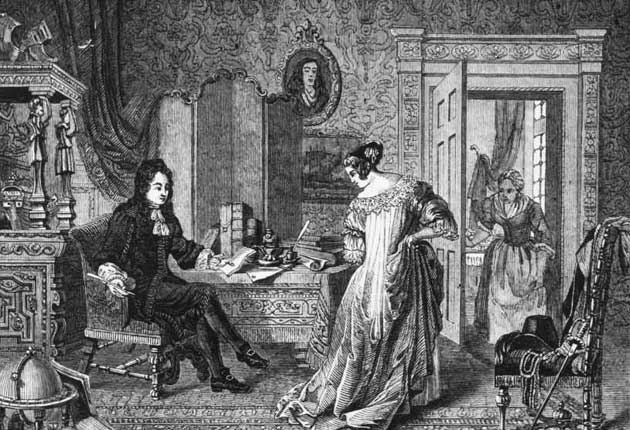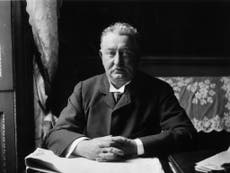You're not the only one feeling miserable - even Samuel Pepys thought Christmas was ruined
His diaries show laments over the lost spirit of the season pre-date television by, well, about 350 years


Try to flee Christmas and it will find some way to reel you back on a tinsel-wrapped hook. Thanks to the purely secular miracle of low-cost flight, I spent the week before the festival in a Moroccan seaside town where camels sauntered lazily along the endless beach. Only a few, French-influenced restaurants and hotels in the labyrinthine medina had stationed discreet trees at their doors. Here, as the muezzins chanted and the seagulls cried, Christmas at last felt optional, not obligatory – a tolerated eccentricity.
That, I thought, is the way to do it. Then I returned to find a Salvation Army silver band in the airport terminal, grinding their way through “O Holy Night” at a funereal pace. I wondered, as usual, why no one ever grasps that Adolphe Adam’s “Minuit, chrétiens!” (its original title) is not a draggy dirge but an 1840s bel canto aria in the manner of Bellini and Donizetti – show-stopping top notes and all – re-engineered as a carol. It needs to be brisk and bouncy, with an Italianate swing. From Jessye Norman to Whitney Houston, Mariah Carey to Celine Dion, none of the spangled legion of divas and wannabe divas (that means you, Charlotte Church) who take Adam’s warhorse out for a seasonal airing treats it as a jaunty operatic number rather than a liturgical plod.
Why should I care? Somehow, I do. Even the Christmas you yearn to escape – or half-escape – has to be pitch-perfect. Shun the vulgar sparkle of commercialised festivity, and you may just be nurturing the delusion of some pristine ritual, free of glitz and hype. That probably never existed – any more than my fantasy rendering of “O Holy Night” in authentic bel canto style.
Christmas will always in some measure disappoint. So its aftermath may be the best moment not to resist, but to embrace, a mood of disenchantment. Today, the clamour of sport and sales will rush in to disguise the hangover and conceal the comedown. That only postpones the inevitable crash. Still, Scrooge-like contempt for the whole brash business fools nobody. It simply betrays, as misanthropy often does, the scoffer’s dashed hopes and thwarted expectations.
More consoling might be the enjoyment of a smaller, shorter Christmas: closer to two than 12 days. Like other modern indulgences, these holidays have abandoned all proportion. As with snack food, elite football, social media and movie franchises, Christmas has swollen into monstrous, self-devouring dimensions. The consumer economy tends to super-size treats and comforts. It lacks a thermostatic regulator – or just portion-control. Valid pleasures snowball from sufficiency to surfeit. Religious moralists deplore “pagan” excess, but it was the wise paganism of ancient Greece that counselled “moderation in all things”. Even for children, less Christmas might feel like more.
But beware immoderate nostalgia. The briefer holidays of centuries past could still incite raucous and reckless behaviour. I went back to the diaries of Samuel Pepys to see how the self-made naval bureaucrat and man-about-Restoration London celebrated Christmas in the 1660s. Scarcely two decades after the Puritans’ bitterly resented bid to ban idolatrous rites, the festival had roared back into fashion. All the same, it never hung around too long. On 26 December 1663, Pepys does spend “all the afternoon with my wife to cards”, but later goes off “to my office, writing letters”.
In 1661, the evening of Christmas Day itself finds him back in the office – “practising arithmetique alone” – but only after scoffing at home “a mess of brave plum-porridge and a roasted pullet for dinner; and I sent for a mince-pie abroad”. Those pies have a starring role in the Pepys family Christmas, while in 1661 “a Washeall [wassail]-bowle woman and girl came to us and sung to us”. On 20 December 1663, Sam relishes “a good turkey roasted for our supper”. Carols, turkey, mince pies: Pepys’s diaries, incidentally, correct those know-alls who inform you that every Yuletide tradition is a “Victorian” fabrication.
Over-indulgence also has its place for him, alongside those late-night maths exercises. On 27 December 1660, “about the middle of the night I was very ill, I think with eating and drinking too much”. I love that judiciously non-committal “I think”. The predictable outcome? “I was forced to call the mayde... and vomited in the bason.” To binge drinking add a charge of sacrilegious lechery. Christmas Day 1664 sees him hearing a sermon among the Huguenot migrants of the “French church”. Typically, his eye drifts down from heaven to those chic Frenchwomen in the aisles: “And a very great store of fine women there is in this church, more than I know anywhere else.”
Above all, the diaries show that priestly laments about the forgotten “real” meaning of Christmas pre-date television God-slots by 350 years. At the royal chapel in Whitehall, in 1662, Pepys scorns a “poor sermon” from some mitred killjoy, “reprehending the mistaken jollity of the Court for the true joy that shall and ought to be on these days”. That went down like a leaden periwig with Charles II’s merry courtiers: “It was worth observing... that they all laugh in the chapel when he reflected on their ill actions and courses.” Woe betide the bishop who tried to drag religion into the Restoration smart set’s Christmas revels.
So nostalgia for some vanished age of faith will no more cure post-festive flatness than cynicism or avoidance. Instead, learn to tolerate or even appreciate the hangover. Relish these sated and sedated days when decorations sag, roasts dry, puddings harden, fizz flattens and guests, even the jolliest (especially the jolliest), outstay their welcome. Not for nothing does Shakespeare’s most bittersweet comedy carry the title Twelfth Night. This period of melancholy hiatus can have a charm of its own.
It also boasts a literary masterwork. If, in A Christmas Carol, Dickens created the ultimate festive fable, then the aftermath has a more modern champion. I still find it astonishing that James Joyce had finished “The Dead” by 1907, when he was 25. Living hand-to-mouth in Trieste and Rome, the self-exiled Dubliner channelled all his mixed feelings about home into this “Christmas-time” story of stalled dreams, veiled tensions, lost loves and divided minds.
“The Dead” takes place in Dublin some time in the week before Epiphany (6 January) in 1904: characters argue over a recent decree of the reactionary new Pope, Pius X, expelling female singers from church choirs. At their house at Usher’s Island, the musical Misses Morkan, Julia and Kate, are hosting their annual party for family and friends. Everyone insists that this still counts as a Christmas feast, though seasonal cheer is by now fading fast.
Indeed, Joyce out-Dickenses Dickens with his evocation of the groaning board: “A fat brown goose lay at one end of the table and at the other end, on a bed of creased paper strewn with sprigs of parsley, lay a great ham, stripped of its outer skin and peppered over with crust crumbs, a neat paper frill round its shin and beside this was a round of spiced beef...” And so, lip-smackingly, on. The intellectual Gabriel Conroy, who doubts every piety of church and country, pays sincere tribute in his speech to “the tradition of genuine warm-hearted courteous Irish hospitality” upheld by his beloved aunts. However, their generosity cannot harmonise the guests, heal their wounds or calm their fears.
Nationalist and Unionist; Catholic and Protestant; old and young; above all, husband and wife: seasonal goodwill alone will not banish the pain of their divisions and misunderstandings. Gulfs and griefs, large and small, persist.
This music-loving company even wrangles about favourite singers and best performances. Only the freakish snow that “was general all over Ireland” can unify everyone and everything, as it falls “on every part of the dark central plain, on the treeless hills, falling softly upon the Bog of Allen and, farther westward, softly falling into the dark mutinous Shannon waves”.
Yet the party is not a sham. The “hospitality” of the Misses Morkan remains precious – sacred, perhaps. Nor is Gabriel’s love for his wife, Gretta, faked, though he comes to recognise that she mourns, and always will, her long-dead lover Michael Furey. Meanwhile, Gabriel senses that “the time had come for him to set out on his journey westward” – towards Irish nationalism, say the political critics; towards death, and a reconciliation with belief, say the religious ones.
Joyce’s masterpiece is the perfect story for anyone torn by festive rituals between consent and resistance, bonhomie and boredom. You don’t really need to take a flight, still less pick a fight, to mark ambivalence about the rites of winter. Reading “The Dead” will suffice – or maybe watching the lovable 1987 film adaptation with which John Huston closed his career.
As 1904 looms, Gabriel remarks that “we are living in a sceptical and, if I may use the phrase, a thought-tormented age”. More than 110 years later, that scepticism, those thoughts, make a naive and sentimental Christmas even harder to achieve. Joyce’s genius is to dramatise the doubts, even the torments, yet still celebrate what Gabriel calls “those qualities of humanity, of hospitality, of kindly humour which belonged to an older day”. Even hung over, I could raise a glass to that.





Join our commenting forum
Join thought-provoking conversations, follow other Independent readers and see their replies